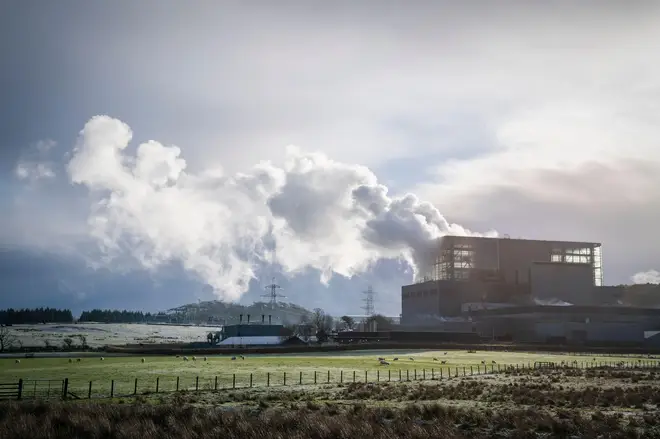
Ali Miraj 1pm - 4pm
7 January 2022, 16:28

One of Scotland's two remaining nuclear power plants has been closed after 46 years of generating electricity - despite only being built to last for 25.
The Hunterston B site in North Ayrshire is believed to have produced enough energy to power every home in Scotland for nearly 31 years since it first came on line.
But growing concerns about safety, after hundreds of cracks in the graphite bricks surrounding the reactor were found, made its closure “inevitable”.
Read more: Weather warnings issued as winter blast hits parts of England, Scotland and Wales
However it’s shutting, and the limited shelf-life of the Torness nuclear plant in East Lothian, has raised concerns about Scotland’s energy mix in the future, the potential for rising bills to be hiked even further and the possibility of putting the Scottish Government’s net zero plans at risk.
EDF, which runs the plant, claim the carbon avoided by the facility is the equivalent of taking every car off Scotland’s roads for 19 years, while the Nuclear Industry Association says 1.3 billion cubic metres of natural gas would be required to replace the electricity output of Hunterston B.
It also claims that since September 2021, Hunterston has saved consumers £360 million compared to market electricity prices - that’s worth £152 for every Scottish household.
Station director Paul Forrest said the contribution the plant, near West Kilbride, had made could "not be underestimated" - with the facility providing "stable, well paid jobs" for thousands of people in the area.
He said it had also produced “almost 300 TWh of zero-carbon electricity, enough to power every home in Scotland for 31 years.
"It was originally thought Hunterston B would run for 25 years but investment in the plant and the people who work here mean we've been able to safely extend that to 46 years.
"This is an incredible achievement and everyone here is proud of what the station has accomplished.
"We will pause to reflect the end of generation but we are looking forward to the future. We don't just switch off the power station, close the gates and walk away. It will take time to defuel and decommission the site and we will continue to need skilled people to do this."
Environmental campaigners, however, said the final shutdown of Hunterston B was "inevitable".
Lang Banks, the director of WWF Scotland, said the plant had become increasingly unreliable, and argued that growth in renewable energy means nuclear power is no longer required.
He added: "Thankfully Scotland has massively grown its renewable power-generating capacity, which means we'll no longer need the electricity from this increasingly unreliable nuclear power plant.
"As the expensive and hazardous job of cleaning up the radioactive legacy Hunterston leaves in its wake now begins, Scotland must press on with plans to harness more clean, renewable energy."
The UK Government has said it is hoping to bring forward small modular reactors to contribute to the energy mix, however the SNP said it still held “opposition to new nuclear stations under current technologies.”
Scottish ministers are hoping to scale up renewable energy as part of the transition away oil and gas – but pressures on the electricity grid will increase as more technology is plugged in.
GMB Scotland secretary Louise Gilmour said: "Hunterston B has been a work-horse for Scotland's energy mix, it's helped keep the lights on and delivered opportunity and prosperity on the west coast for nearly 50 years.
"The story of the station and its workforce should be celebrated, but Hunterston's decommission is also a lament over the Scottish Government's attitude towards nuclear.
"This is a viable low-carbon industry that can help create and sustain the domestic energy production and employment opportunities we need to play our part in confronting the climate crisis.
"This shouldn't be the beginning of the end for Scotland's nuclear story - we are still going to need secure electricity supply on the days when the wind doesn't blow."
A Scottish Government spokesperson said: "Hunterston B, its operators and in particular the workforces who have staffed the plant for more than 40 years, have played an important role in supporting Scotland's energy requirements.
"We do however remain clear in our opposition to the building of new nuclear power plants in Scotland under current technologies.
"Significant growth in renewables, storage, hydrogen and carbon capture provide the best pathway to net zero by 2045, and will deliver the decarbonisation we need to see across industry, heat and transport.
"We recognise that planning will be crucial to ensure that economic and social opportunities from the transition are not missed.”